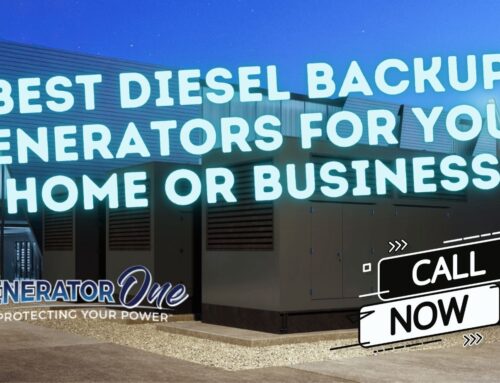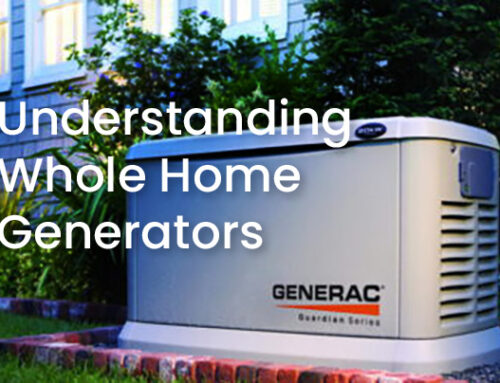Power outages are something most Ohio homeowners are familiar with. Thunderstorms, heavy snow and other forms of extreme weather can all lead to short-term power outages. You may have fond memories of the first power outage you experienced as a child, but for adults, the stress of spoiled food or damage to essential appliances or medical equipment makes outages less fun.
Common Power Outage Causes
Ohio homeowners may experience power outages for several reasons. In some cases, the outage is due to planned engineering works, in which case the supplier will send out maintenance alerts so homeowners can prepare themselves for the disruption to their energy supply.
In other cases, the outage is unplanned and due to an unexpected fault or extreme weather. NE Ohio sees the full spectrum of weather conditions throughout the year, including:
- Thunderstorms
- Heavy snow and ice
- High winds
Why Homeowners Use Backup Generators
Because power cuts are something that can happen multiple times per year, many homeowners opt to invest in home generators powered by natural gas or liquid petroleum gas and an uninterruptible power supply (UPS) to run essential appliances.
A UPS has a battery that will automatically take over when the home’s main supply is interrupted. This battery holds sufficient energy to keep appliances working for a few minutes until the backup power source takes over. There are several varieties of automatic home standby generators, with the most well-known being a portable generator that runs on gas or liquid propane.
Portable models can be a great choice in remote locations, but not for a whole house generator. Those who live in areas that see regular supply cuts and need reliable power may wish to consider an automatic backup generator as a more permanent solution.
The Pros and Cons of Portable Generators
As the name suggests, a portable generator is a relatively small device that can be used to provide backup power in an emergency. This kind of generator relies on gasoline and must be manually started and refueled to keep it going.
The output of this type of generator varies depending on its size, but in most cases, it won’t be enough to power the entire home. Choosing the right generator size is important to ensure you can keep everything running properly.
Important Installation Considerations
There can be safety issues with this kind of generator, too. It must be kept somewhere that’s well ventilated to reduce the risk of carbon monoxide poisoning. Some homeowners may be tempted to put smaller portable generators in the basement, but this can be a dangerous choice.
If homeowners want an automatic system that will take over and keep everything that uses the home’s electrical system going, they’ll need an automatic standby generator connected to their property.
Why Choose an Automatic Standby Generator?
Automatic standby generators connect to the home’s electrical system and will take over and supply power directly in the event of a power outage. These dedicated home standby generators connect to the property’s existing natural gas supply and are better suited to supplying power for extended periods.
When an automatic backup generator runs properly, it can provide electricity for most, if not all, of the appliances in a property. The generator connects to the electrical supply, and in the event of a power outage, it will start automatically whether the homeowner is there to trigger it or not.
Power Your North Central Ohio Home
If you choose the right home backup generator, it should be sufficient to power a sump pump, air conditioner and important appliances, giving you peace of mind that you can still get by even if there’s a repeat of the thunderstorms that hit Northeast Ohio in 2022, knocking out electricity to thousands of properties.
Home Backup Generators Installed Professionally
Because static generators require electrical connections, it’s important that they’re installed professionally. Installation costs vary depending on the size of the generator, the location of the installation site and how easy it is to wire up the transfer switch and connections for your home’s electrical panel.
Generac Home Backup Generators Give Peace of Mind
Generator One is the number one Generac generator dealer in northeast Ohio. If you’re considering a home backup power generator for your property, we’re here to help you understand your generator options. Our professional installers will help you select the right home automatic backup power generator, and should you decide to join the club of Real Generac Owners, they’ll talk you through the installation process and fit it in accordance with local building codes so you’re ready for the next power outage.
Generac generators can be powered by either natural gas or an LP fuel supply. In addition, the free mobile link feature offers remote monitoring. Real Generac Owners can download the Mobile Link app to keep track of the current operating status of their Generac home backup generator from anywhere.
Choosing a Natural Gas Home Standby Generator
It’s vital homeowners choose the right generator for the size of their property and type of appliances they want to power. If you want something to keep your air conditioning working throughout the year, keep your home security system running and offer automatic operation, you’ll need a home standby generator with sufficient energy output to cover that.
Local planning considerations should be taken into account when installing generators or other outdoor power equipment. Not only will you need the necessary electrical connections, but the installer must connect the generator to an LP fuel line or gas supply and fit an automatic transfer switch to ensure the power supply will switch from mains to the backup power generator and back again as required.
When backup generators are running properly, you’ll have a relatively seamless experience. Your central air conditioning unit should keep working, along with other appliances, without you having to worry about topping up the gasoline every few hours.




